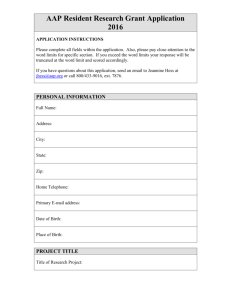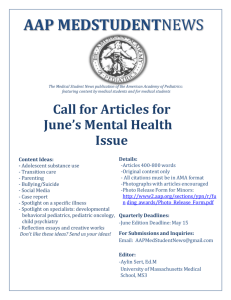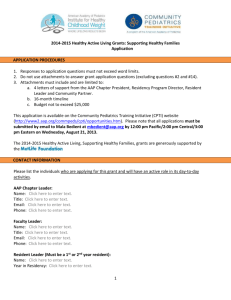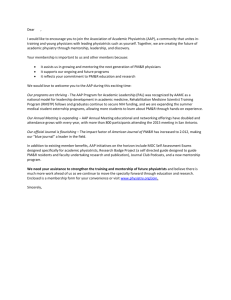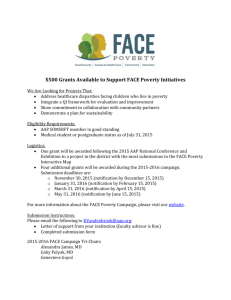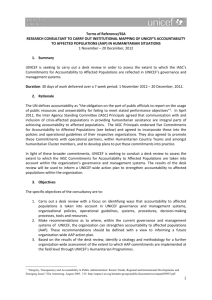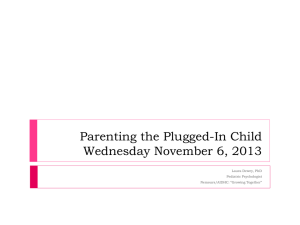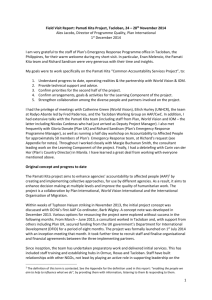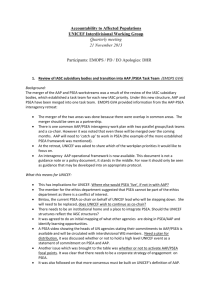Terms of Reference
advertisement
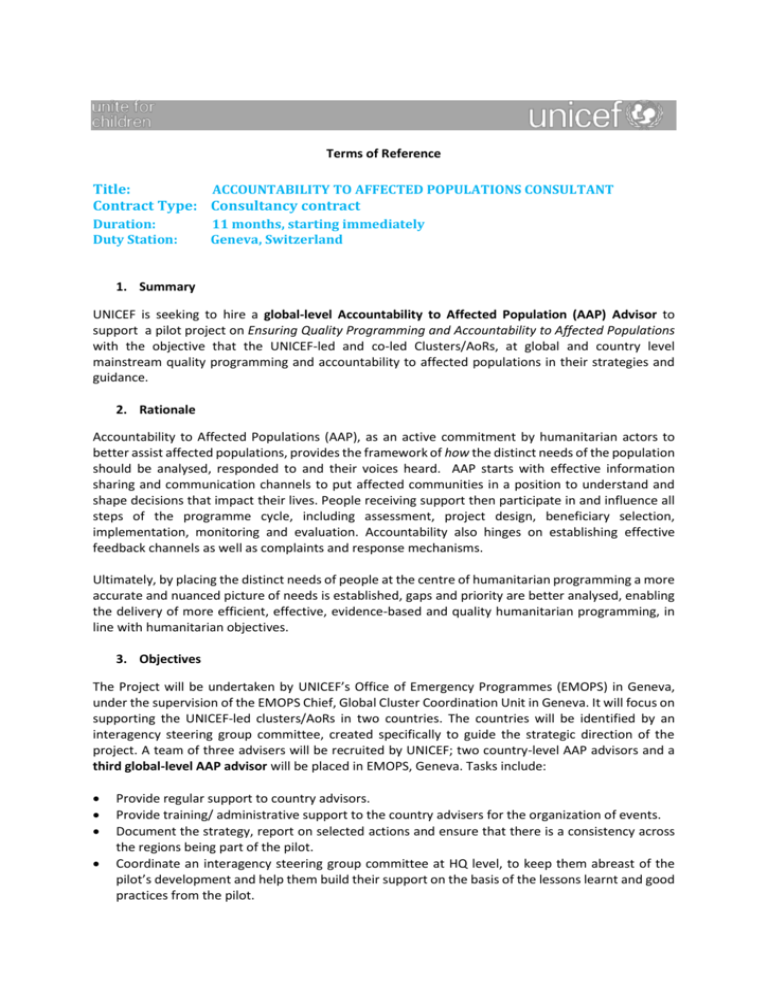
Terms of Reference Title: ACCOUNTABILITY TO AFFECTED POPULATIONS CONSULTANT Contract Type: Consultancy contract Duration: Duty Station: 11 months, starting immediately Geneva, Switzerland 1. Summary UNICEF is seeking to hire a global-level Accountability to Affected Population (AAP) Advisor to support a pilot project on Ensuring Quality Programming and Accountability to Affected Populations with the objective that the UNICEF-led and co-led Clusters/AoRs, at global and country level mainstream quality programming and accountability to affected populations in their strategies and guidance. 2. Rationale Accountability to Affected Populations (AAP), as an active commitment by humanitarian actors to better assist affected populations, provides the framework of how the distinct needs of the population should be analysed, responded to and their voices heard. AAP starts with effective information sharing and communication channels to put affected communities in a position to understand and shape decisions that impact their lives. People receiving support then participate in and influence all steps of the programme cycle, including assessment, project design, beneficiary selection, implementation, monitoring and evaluation. Accountability also hinges on establishing effective feedback channels as well as complaints and response mechanisms. Ultimately, by placing the distinct needs of people at the centre of humanitarian programming a more accurate and nuanced picture of needs is established, gaps and priority are better analysed, enabling the delivery of more efficient, effective, evidence-based and quality humanitarian programming, in line with humanitarian objectives. 3. Objectives The Project will be undertaken by UNICEF’s Office of Emergency Programmes (EMOPS) in Geneva, under the supervision of the EMOPS Chief, Global Cluster Coordination Unit in Geneva. It will focus on supporting the UNICEF-led clusters/AoRs in two countries. The countries will be identified by an interagency steering group committee, created specifically to guide the strategic direction of the project. A team of three advisers will be recruited by UNICEF; two country-level AAP advisors and a third global-level AAP advisor will be placed in EMOPS, Geneva. Tasks include: Provide regular support to country advisors. Provide training/ administrative support to the country advisers for the organization of events. Document the strategy, report on selected actions and ensure that there is a consistency across the regions being part of the pilot. Coordinate an interagency steering group committee at HQ level, to keep them abreast of the pilot’s development and help them build their support on the basis of the lessons learnt and good practices from the pilot. Assess the needed institutional changes to support a more systematic mainstreaming of people centred issues and make recommendations to the agency and to the clusters/AoRs. Actively engage with the existing interagency AAP task team and ad hoc group on cross-cutting issues to ensure that the lessons learnt, good practices and tools developed inform the interagency reflection and approach on AAP and cross-cutting issues. Actively engage with country-level AAP advisors to ensure information on strategic decisions and are understood and incorporated. Exchange with other clusters, on the respective processes used to develop an integrated approach to People Centred Humanitarian Approach (PCHA). Liaise with the GenCap project to identify opportunities for country AAP advisers to collaborate with country-based GenCap advisers. Ensure that UNICEF’s teams in NY and Geneva are kept abreast of the project’s achievement and that it informs the agency’s implementation of its AAP work. Report to funding agencies on progress of the project. 4. Methodology The pilot project will be conducted in close collaboration with the ad hoc group on crosscutting issues and with the AAP Task Team, ensuring that findings are regularly shared with these groups. The global/level AAP Advisor will ensure that progress, information and good practice and challenges are regularly shared with cluster partners on the Cluster/AoR websites and through regular newsletters/updates. Support UNICEF-led Clusters/ AoRs, in diagnosing what are the collective barriers and opportunities to people centred programming. Using the agreed methodologies, help analyse, identify and prioritize the specific affected groups and issues that require particular attention in their sectorial response. To note, some of this work may already have been initiated at country level, and there may be opportunities to replicate or build on existing initiatives. Based on a more manageable and focused list of priority issues, analyse current programmatic response gaps and opportunities, identify the strategic and operational actions that will allow addressing prioritized needs & issues and will define objectives and milestones they will be accountable to. Translate identified priority issues into programmatic approaches & tools. Provide hands on support to Cluster/AoR partners in implementing a tool / approach that improves the quality and accountability to affected populations mechanisms within their response. Monitor progress of the planned operations, with possible corrective action, as advised by Steering Committee. From the experience in the first two countries, and possibly others, capture methodology used, lessons learnt and good practices, and elaborate a system to design and implement a people centred approach that helps demystify, simplify and operationalize AAP at all steps (identify needs, analyse, prioritise, program operation, monitor). 5. Supervision The Project will be undertaken by UNICEF’s Office of Emergency Programmes (EMOPS) in Geneva, under the supervision of the EMOPS Chief, Global Cluster Coordination Unit in Geneva. 6. Duty Station Geneva, Switzerland 7. Qualification or specialized knowledge / experience required At least 5 years of experience in humanitarian response, including operational experience. Proven knowledge of the subject area and experience working on AAP in operational settings. Masters degree, or equivalent experience in international relations, humanitarian law, social anthropology or related fields. Experience of partnership approaches and environments – governments, national and international NGOs and UN is highly desirable Ability to work on short time lines, under pressure, and managing multiple priorities simultaneously with minimum supervision Excellent writing, conceptual and analytical skills including the ability to present complex processes and issues clearly to a heterogeneous audience and in an actionable manner. Fluency in English is essential. 8. How to apply Applicants are requested to send their submissions to mlolavarria@unicef.org with the subject line “ACCOUNTABILITY TO AFFECTED POPULATIONS CONSULTANT”by COB 16 October 2015. Please indicate your ability, availability and monthly rate (in US$) to undertake the terms of reference above. Applications submitted without a monthly rate will not be considered. Applications must include: • Cover letter • CV • P-11 form (available at http://www.unicef.org/about/employ/files/P11.doc ) Please note that acknowledgement of application will be extended only to short-listed candidates.
